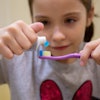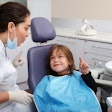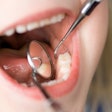Excessive screen time may contribute to the progression of early childhood caries (ECC), highlighting the need for better prevention efforts, according to a study recently published in BMC Oral Health.
Efforts should include family-centered approaches that promote better oral hygiene habits and less time in front of electronics, the authors wrote.
“High PSE may contribute to the progression of ECC, as evidenced by a higher prevalence of cavitated lesions among children with elevated PSE scores,” wrote the authors, led by Dhanraj Kalaivanan of the Sathyabama Dental College and Hospital in India (BMC Oral Health, July 16, 2025, Vol. 25, 1181).
The cross-sectional observational study included 100 preschool-age children diagnosed with ECC between June and December 2024. Screen exposure data was collected using the validated Seven-in-Seven Screen Exposure Questionnaire, based on American Academy of Pediatrics guidelines, they wrote.
The questionnaire measured factors such as daily screen time, screen use during meals and bedtime, age at first exposure, and content type. Caries severity was assessed using the International Caries Detection and Assessment System (ICDAS-II) during clinical exams. All evaluations were done at the child’s first dental visit to ensure unbiased baseline data.
Among the participants, 57% had high PSE scores, and 71% of parents allowed their children to use more than one electronic device daily. According to ICDAS-II criteria, 75% of the children had cavitated lesions, they wrote.
While high PSE was linked to higher mean ICDAS scores for molars (p = 0.025), the overall correlation between PSE and ECC severity was weak and not statistically significant (r = 0.042, p = 0.680). Higher ICDAS scores were observed in families with three or more children, and parental education also played a role. Additionally, children using nonfluoridated toothpaste showed increased caries severity.
Nevertheless, the study had limitations. Its cross-sectional design prevented establishing a causal relationship between PSE and ECC severity, the authors added.
“Fostering positive child-parent relationships, enforcing screen-use rules and effectively managing screen time can help prevent ECC and enhance preschoolers’ quality of life,” Kalaivanan and colleagues concluded.




















